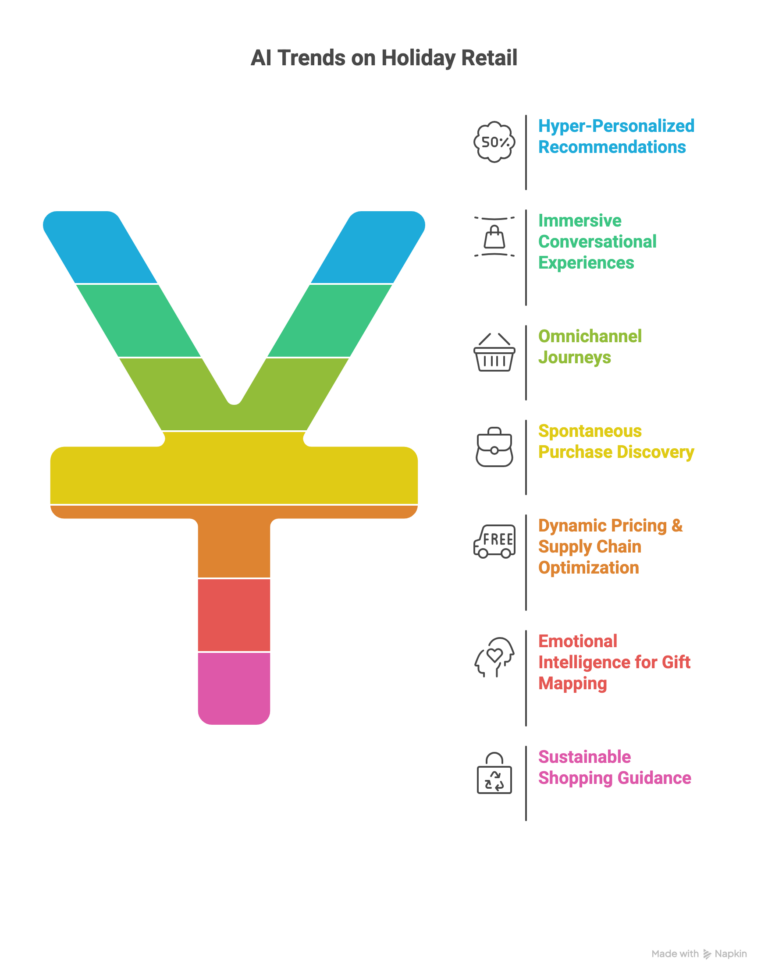Greetings! I'm Aneesh Sreedharan, CEO of 2Hats Logic Solutions. At 2Hats Logic Solutions, we are dedicated to providing technical expertise and resolving your concerns in the world of technology. Our blog page serves as a resource where we share insights and experiences, offering valuable perspectives on your queries.

Artificial intelligence is transforming holiday retail, with AI recommendations influencing 19% of purchases in 2024 and 52% of shoppers planning to use AI tools this year. This represents a breakthrough moment where AI retail solutions become mainstream, revolutionizing product discovery, personalization, and checkout processes during the most critical sales period.
AI in Holiday Shopping 2025
Today’s consumers are already embracing AI shopping assistants and personalized recommendations, with adoption rates accelerating as retailers invest heavily in artificial intelligence retail technologies.
AI Shopping Adoption Statistics and Consumer Behavior Trends
The data reveals a dramatic shift in consumer behavior toward AI-powered holiday shopping:
- 63% of consumers express curiosity about using ChatGPT-style assistants for gift discovery, guidance, and product questions, a significant jump from just 31% in 2024
- 85% of Gen Z and Millennials show openness to using generative AI while shopping
- 52% of shoppers plan to use AI tools for holiday shopping research this year
- Two-thirds of millennials now prefer AI tools over traditional search engines for product discovery
7 AI Shopping Trends Transforming Holiday Retail
These seven AI-powered innovations represent the most significant advancement in holiday shopping technology, offering retailers unprecedented opportunities to enhance customer experiences while driving revenue growth.

1. Hyper-Personalized AI Shopping Recommendations & Intelligent Shopping Assistants
Advanced AI personalized recommendations are moving beyond simple browsing history analysis to incorporate deep learning algorithms that understand individual preferences, seasonal patterns, and gift-giving contexts. Modern AI shopping assistants like Amazon’s Rufus and Walmart’s Sparky are becoming more sophisticated, handling comprehensive product research, price comparisons across multiple retailers, and even predictive gift suggestions based on recipient profiles.
Real-time sentiment analysis now predicts gift satisfaction likelihood by examining product reviews, return rates, and recipient feedback patterns. When consumers ask for “gifts for my tech-savvy teenager,” AI assistants can factor in current trends, age-appropriate technology, budget constraints, and even specific interests gleaned from previous interactions to provide tailored suggestions that go far beyond generic product catalogs.
2. AI-Powered Conversational Shopping Experiences
Generative AI is creating photorealistic digital product twins that allow customers to visualize gifts in their intended environments, seeing how furniture looks in their living room or how jewelry appears on different skin tones. Voice-activated AI shopping assistants are becoming increasingly sophisticated, with more than half of customers now using voice searches when looking for items to buy.
The integration of AR/VR with artificial intelligence retail platforms creates immersive discovery experiences where customers can virtually “try on” products, see items in realistic settings, and even participate in virtual shopping experiences with friends and family. These technologies are particularly powerful for holiday shopping, where gift recipients aren’t present to provide feedback.
3. AI Omnichannel Holiday Shopping Journeys
Unified AI-powered e-commerce experiences are breaking down traditional channel barriers, creating transitions between online browsing, social media discovery, in-store visits, and mobile app interactions. Smart inventory management systems powered by predictive AI retail solutions ensure that products viewed online are automatically reserved for in-store pickup.
Social commerce integration has become particularly sophisticated, with platforms like TikTok Shop using AI to create transitions from content consumption to purchase completion. The AI systems understand content engagement patterns and can predict purchase intent based on viewing behavior, interaction types, and timing.
Ready to Transform Your Holiday Shopping Experience?
4. AI-Driven Spontaneous Purchase Discovery & Holiday Shopping AI Tools
Serendipitous product discovery through advanced machine learning algorithms is revolutionizing how consumers find unexpected gifts and treats. These systems analyze subtle behavioral cues, browsing patterns, time spent on pages, scroll velocity, and click sequences, to identify micro-moments when consumers are most receptive to new product suggestions.
AI shopping tools now excel at surfacing products consumers didn’t know they wanted by connecting seemingly unrelated data points. The algorithms understand that holiday shopping often involves exploration and discovery, not just fulfilling predetermined shopping lists.
5. Dynamic AI Pricing & Smart Supply Chain Optimization
Real-time pricing optimization using artificial intelligence retail analytics enables retailers to adjust prices throughout the holiday season based on demand patterns, competitor pricing, inventory levels, and individual customer willingness to pay. These sophisticated algorithms consider dozens of variables simultaneously to present optimal pricing that maximizes both conversion and profit margins.
Predictive demand forecasting powered by comprehensive AI retail solutions has become crucial for holiday success, with retailers using machine learning to anticipate regional preferences, timing of peak demand, and potential supply chain disruptions.
6. Emotional Intelligence AI for Holiday Gift Relationship Mapping
AI systems are developing a sophisticated understanding of complex relationship dynamics for personalized gifting recommendations that go beyond demographic data. These algorithms analyze communication patterns, shared activities, previous gift exchanges, and even social media interactions to suggest presents that strengthen relationships and create meaningful experiences.
Cultural sensitivity algorithms enhance AI shopping recommendations accuracy by considering recipients’ backgrounds, traditions, and values. The technology understands that gift-giving practices vary significantly across cultures and can adjust suggestions accordingly.
7. Sustainable AI Shopping Guidance for Ethical Holiday Retail
Carbon footprint analysis integrated into AI retail solutions helps environmentally conscious consumers make responsible purchasing decisions during the holiday season. The technology calculates shipping emissions, product lifecycle impacts, packaging waste, and manufacturing sustainability scores, presenting this information alongside traditional factors like price and reviews.
Ethical sourcing verification through artificial intelligence retail systems provides real-time transparency about supply chain practices, labor conditions, and fair trade certifications.
AI Holiday Shopping Implementation Strategies for Retailers
Successful AI retail solutions deployment requires strategic planning, proper technology integration, and comprehensive staff training to maximize return on investment during peak holiday seasons.
Getting Started with AI Retail Solutions
Retailers should begin with customer-facing AI implementations that provide immediate value:
- Start with chatbots and virtual shopping assistants for basic customer service inquiries, product recommendations, and order tracking
- Integrate gradually with existing e-commerce platforms before expanding to mobile apps and in-store systems
- Ensure data consistency across all touchpoints so AI recommendations remain relevant and personalized
- Provide comprehensive staff training on AI system oversight and optimization
AI Holiday Shopping Challenges and Considerations
While AI shopping trends offer tremendous benefits, retailers must address privacy concerns, technology barriers, and maintain human connections to ensure successful implementation.
Consumer Privacy and Data Security
Data collection transparency represents a fundamental concern as AI shopping assistants require extensive personal information to generate effective recommendations. Consumers need clear understanding of what data is collected, how it’s used, and who has access to their shopping patterns and preferences.
Technology Adoption Barriers
Implementation costs for AI retail solutions can be prohibitive for smaller retailers, creating competitive disadvantages during critical holiday periods. The technology requires significant upfront investment in software licenses, data infrastructure, integration services, and ongoing maintenance.
Don't Get Left Behind This Holiday Season
Success Stories
Retailers implementing comprehensive AI shopping solutions report conversion rate improvements of 15-25% during holiday periods, with average order values increasing by 20-35% when AI systems successfully identify complementary products and gift bundles.
Conclusion
The integration of AI shopping trends into holiday retail strategies represents a fundamental shift that will determine competitive advantage, customer satisfaction, and business growth in the evolving digital marketplace. Retailers who successfully implement comprehensive artificial intelligence retail solutions will capture disproportionate market share by providing personalized experiences that meet rising consumer expectations.
FAQ
How accurate are AI personalized recommendations for holiday gifts?
AI recommendation accuracy has improved dramatically, with current systems achieving 70-85% relevance rates for personalized suggestions. The technology analyzes purchase history, browsing patterns, demographic data, and seasonal trends to generate recommendations that align with individual preferences and gift-giving contexts.
Are my data safe with AI shopping assistants during holiday purchases?
Reputable retailers implement enterprise-grade security measures including data encryption, access controls, and privacy compliance frameworks. However, consumers should review privacy policies, understand data collection practices, and utilize privacy settings to control information sharing levels with AI systems.
How much do artificial intelligence retail systems cost for holiday seasons?
Implementation costs vary depending on the size and complexity of your business, ranging from modest investments for basic AI tools to comprehensive enterprise solutions.

Related Articles







